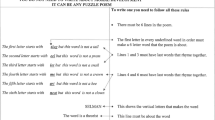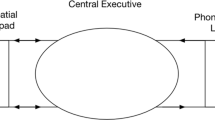Abstract
Depletion of limited working memory resources may occur following extensive mental effort resulting in decreased performance compared to conditions requiring less extensive mental effort. This “depletion effect” can be incorporated into cognitive load theory that is concerned with using the properties of human cognitive architecture, especially working memory, when designing instruction. Two experiments were carried out on the spacing effect that occurs when learning that is spaced by temporal gaps between learning episodes is superior to identical, massed learning with no gaps between learning episodes. Using primary school students learning mathematics, it was found that students obtained lower scores on a working memory capacity test (Experiments 1 and 2) and higher ratings of cognitive load (Experiment 2) after massed than after spaced practice. The reduction in working memory capacity may be attributed to working memory resource depletion following the relatively prolonged mental effort associated with massed compared to spaced practice. An expansion of cognitive load theory to incorporate working memory resource depletion along with instructional design implications, including the spacing effect, is discussed.





Similar content being viewed by others
References
Benjamin, A. S., & Tullis, J. (2010). What makes distributed practice effective? Cognitive Psychology, 61, 228–247. https://doi.org/10.1016/j.cogpsych.2010.05.004.
Conlin, J. A., Gathercole, S. E., & Adams, J. W. (2005). Children’s working memory: investigating performance limitations in complex span tasks. Journal of Experimental Child Psychology, 90, 303–317. https://doi.org/10.1016/j.jecp.2004.12.001.
Conway, A. R. A., Kane, M. J., Bunting, M. F., Hambrick, D. Z., Wilhelm, O., & Engle, R. W. (2005). Working memory span tasks: a methodological review and user’s guide. Psychonomic Bulletin & Review, 12, 769–786. https://doi.org/10.3758/BF03196772.
Delaney, P. F., Verkoeijen, P. P. J. L., & Spirgel, A. (2010). Spacing and testing effects: a deeply critical, lengthy, and at times discursive review of the literature. In B. H. Ross (Ed.), The psychology of learning and motivation: advances in research and theory (Vol. 53, pp. 63–147). New York: Academic. https://doi.org/10.1016/S0079-7421(10)53003-2.
Ebbinghaus, H. (1885/1964). Memory: a contribution to experimental psychology. Oxford: Dover.
Geary, D. C. (2008). An evolutionarily informed education science. Educational Psychologist, 43, 179–195. https://doi.org/10.1080/00461520802392133.
Geary, D. (2012). Evolutionary educational psychology. In K. Harris, S. Graham, & T. Urdan (Eds.), APA Educational Psychology Handbook (Vol. 1, pp. 597–621). Washington, D.C.: American Psychological Association.
Geary, D., & Berch, D. (2016). Evolution and children’s cognitive and academic development. In D. Geary & D. Berch (Eds.), Evolutionary perspectives on child development and education (pp. 217–249). Switzerland: Springer.
Gluckman, M., Vlach, H. A., & Sandhofer, C. M. (2014). Spacing simultaneously promotes multiple forms of learning in children’s science curriculum. Applied Cognitive Psychology, 28, 266–273. https://doi.org/10.1002/acp.2997.
Healey, M. K., Hasher, L., & Danilova, E. (2011). The stability of working memory: do previous tasks influence complex span? Journal of Experimental Psychology: General, 140, 573–585. https://doi.org/10.1037/a0024587.
Kapler, I. V., Weston, T., & Wiseheart, M. (2015). Spacing in a simulated undergraduate classroom: long-term benefits for factual and higher-level learning. Learning and Instruction, 36, 38–45. https://doi.org/10.1016/j.learninstruc.2014.11.001.
Kirschner, P. A., Sweller, J., & Clark, R. E. (2006). Why minimal guidance during instruction does not work: an analysis of the failure of constructivist, discovery, problem-based, experiential, and inquiry-based teaching. Educational Psychologist, 41, 75–86. https://doi.org/10.1207/s15326985ep4102_1.
Küpper-Tetzel, C. E. (2014). Understanding the distributed practice effect: strong effects on weak theoretical grounds. Zeitschrift für Psychologie, 222, 71–81. https://doi.org/10.1027/2151-2604/a000168.
Paas, F. (1992). Training strategies for attaining transfer of problem-solving skill in statistics: a cognitive-load approach. Journal of Educational Psychology, 84, 429–434.
Paas, F., & Sweller, J. (2012). An evolutionary upgrade of cognitive load theory: using the human motor system and collaboration to support the learning of complex cognitive tasks. Educational Psychology Review, 24, 27–45. https://doi.org/10.1007/s10648-011-9179-2.
Paas, F., & van Merriënboer, J. J. G. (1994). Variability of worked examples and transfer of geometrical problem-solving skills: a cognitive-load approach. Journal of Educational Psychology, 86, 122–133. https://doi.org/10.1037/0022-0663.86.1.122.
Paas, F., Tuovinen, J. E., Tabbers, H. K., & Van Gerven, P. W. M. (2003). Cognitive load measurement as a means to advance cognitive load theory. Educational Psychologist, 38, 63–71. https://doi.org/10.1207/S15326985EP3801_8.
Rohrer, D., & Taylor, K. (2007). The shuffling of mathematics problems improves learning. Instructional Science, 35, 481–498. https://doi.org/10.1007/s11251-007-9015-8.
Schmeichel, B. J. (2007). Attention control, memory updating, and emotion regulation temporarily reduce the capacity for executive control. Journal of Experimental Psychology: General, 136, 241–255. https://doi.org/10.1037/0096-3445.136.2.241.
Schmeichel, B. J., Vohs, K. D., & Baumeister, R. F. (2003). Intellectual performance and ego depletion: role of the self in logical reasoning and other information processing. Journal of Personality and Social Psychology, 85, 33–46. https://doi.org/10.1037/0022-3514.85.1.33.
Sweller, J. (2010). Element interactivity and intrinsic, extraneous, and germane cognitive load. Educational Psychology Review, 22, 123–138. https://doi.org/10.1007/s10648-010-9128-5.
Sweller, J. (2015). In academe, what is learned, and how is it learned? Current Directions in Psychological Science, 24, 190–194. https://doi.org/10.1177/0963721415569570.
Sweller, J. (2016a). Cognitive load theory, evolutionary educational psychology, and instructional design. In D. Geary & D. Berch (Eds.), Evolutionary perspectives on child development and education (pp. 291–306). Switzerland: Springer. https://doi.org/10.1007/978-3-319-29986-0.
Sweller, J. (2016b). Working memory, long-term memory, and instructional design. Journal of Applied Research in Memory and Cognition, 5, 360–367. https://doi.org/10.1016/j.jarmac.2015.12.002.
Sweller, J., & Sweller, S. (2006). Natural information processing systems. Evolutionary Psychology, 4, 434–458.
Sweller, J., Kirschner, P. A., & Clark, R. E. (2007). Why minimally guided teaching techniques do not work: a reply to commentaries. Educational Psychologist, 42, 115–121. https://doi.org/10.1080/00461520701263426.
Sweller, J., Ayres, P., & Kalyuga, S. (2011). Cognitive load theory. New York: Springer.
Tricot, A., & Sweller, J. (2014). Domain-specific knowledge and why teaching generic skills does not work. Educational Psychology Review, 26, 265–283. https://doi.org/10.1007/s10648-013-9243-1.
Tyler, J. M., & Burns, K. C. (2008). After depletion: the replenishment of the self’s regulatory resources. Self and Identity, 7, 305–321. https://doi.org/10.1080/15298860701799997.
Unsworth, N., Heitz, R. P., Schrock, J. C., & Engle, R. W. (2005). An automated version of the operation span task. Behavior Research Methods, 37, 498–505. https://doi.org/10.3758/bf03192720.
Acknowledgements
We would like to thank the students, teachers, and principal of the Chengdu Normal School primary school (Vanke Campus), Chengdu, China for their support.
Funding Information
The second author acknowledges partial funding from CONICYT PAI, national funding research program for returning researchers from abroad, 2014, No 82140021; and PIA–CONICYT Basal Funds for Centers of Excellence, Project FB0003.
Author information
Authors and Affiliations
Corresponding authors
Rights and permissions
About this article
Cite this article
Chen, O., Castro-Alonso, J.C., Paas, F. et al. Extending Cognitive Load Theory to Incorporate Working Memory Resource Depletion: Evidence from the Spacing Effect. Educ Psychol Rev 30, 483–501 (2018). https://doi.org/10.1007/s10648-017-9426-2
Published:
Issue Date:
DOI: https://doi.org/10.1007/s10648-017-9426-2




